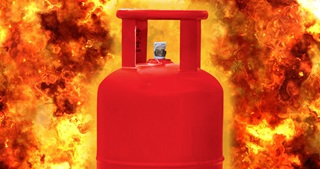However, the potential
severity of a gas cylinder explosion due to improper handling cannot be
overstated. It can pose a severe safety risk and have devastating consequences.
Understanding how to prevent such explosions and respond in an emergency is crucial
for anyone using LPG, whether at home, in hotels, restaurants, or anywhere
else. Let's explore the causes of explosions and how to prevent them, keeping
ourselves and our loved ones safe.
What causes Gas Cylinder
Explosions?
Imagine a fire triangle: fuel,
oxygen, and ignition. LPG is the fuel, and the air around us provides oxygen.
An explosion occurs when a spark or open flame ignites a gas leak, resulting in
a gas cylinder leak. Here's what can trigger this chain reaction:
- Faulty connections or worn-out parts can create leaks, allowing gas
to escape and build up in a confined space.
- Keeping cylinders near stoves, ovens, or direct sunlight can cause
a dangerous pressure increase.
- Dropping, bumping, or tampering with cylinders can damage the
safety valve, leading to uncontrolled gas release.
- Tampering of valve cap or safety seal on a cylinder.
Safety Measures to Prevent Gas
Cylinder Explosions
By following these safety
measures, you can effectively minimize the risk of an explosion.
- Keep the cylinder upright in a cool, well-ventilated area avoiding
direct sunlight and heat sources.
- Regularly check the cylinder and hose for leaks. You can use the
soap water technique to check leaks.
- Use an ISI-marked (Bureau of Indian Standards) pressure regulator
and hose. Replace them periodically as per the manufacturer's
recommendations.
- Always purchase LPG cylinders from authorized dealers who ensure
proper testing and certification.
- If you suspect a leak, immediately turn off the cylinder valve and
open windows for ventilation. Do not light switches, lighters, or
cigarettes. Evacuate the area and contact your gas supplier.
- Before turning on the appliance, perform a quick sniff test around
the cylinder and connections. A gas odour indicates a leak.
- Always turn off the gas supply at the cylinder valve when not in
use, even for short periods.
- Avoid using electrical appliances or open flames near the cylinder
when changing connections or checking for leaks.
Responding to a Gas cylinder Explosion
In case of an uncertain
situation like a gas cylinder explosion:
- Evacuate: Immediately leave the area and ensure
everyone is out of harm's way.
- Alert Others: Shout out and alert
neighbours to evacuate as well.
- Call for Help: Call the fire
department and gas supplier from a safe distance.
- Do Not Re-enter: Never
re-enter the building until emergency personnel declare it safe.
Remember, a little caution goes
a long way. Incorporating these safety measures can protect lives and
properties by preventing dangerous LPG cylinder explosions. Visit our health& safety for more information on
preventive measures and safe practices while using LPG.
